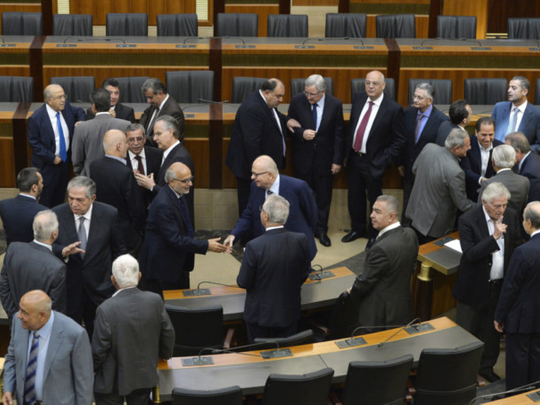
It is about time Lebanese politicians stopped bickering, crying wolf, and sat down to elect a new president. As time goes by and the regional strains start to have an impact on the local economy, politicians must think about the good of the country rather than their own parochial interests and those of their political masters outside Lebanon.
Electing a new Lebanese president is long overdue, the vacuous seat must not be allowed to continue because it makes a mockery of the Lebanese political system and something which people in this part of the world can well do without. With the Syrian war knocking on Lebanon’s doorsteps, the hosting of 1.3 million Syrian refugees and the economic and social straps on the country and of Daesh (Islamic State of Iraq and the Levant) and other terrorist groups on Lebanese soil, surely it is time for the antagonists to try a little harder and come together for a new political understanding.
The test for statesmanship is to go beyond the differences of policies and agendas. True statesmen must think once and for all about the long-term strategic concerns of Lebanon as one lying in a pot of regional turbulence. There is little optimism that a president, standing as a crucial figure-head who may smoothen the affairs of the state, will be elected anytime soon.
The Lebanese parliament has had 16 sessions to elect a president since May 25, when Michel Sulaiman vacated his post in the Baabda Palace with the next vote scheduled next year. These sessions were for the most part useless. They did not have a quorum because of the warring factions centred around the March 8 Group and the March 15 alliance. These are hodgepodge alliances, standing out as a mishmash of Sunnis, Shiites and flavoured with Christian sects and, no doubt, of the political movements they pertain to. Eyeing the political seat, which has to be filled by a Christian, continues to be a tussle of gigantic proportions. These groups believe they will maximise their political gains if they hold out.
But Lebanon today hangs in a political limbo, unable to move on and take important decisions, except through Prime Minister Tammam Salam and his government. But even then, there are major policy decisions that have to be left aside. This is harmful as the Lebanese are opening a wide-ranging front that they may not be quite aware of and are leaving their flanks open to outside powers. Quite rightly so, many European governments — especially France and the Vatican — and also the US continue to beseech the Lebanese government and the parliament on an almost daily basis to end the impasse and to quickly vote in a president.
The Lebanese and especially their politicians have no qualms about even talking to antagonists like Michel Aoun of the Free Patriotic Movement and Samir Geagea of the Lebanese Forces or with Hezbollah and the Future Party led by Sa’ad Hariri. But this raises a deeper set of problems concerning the Lebanese psyche: The insistence to hold talks only for the sake of talking, leading to nowhere.
Political warlords
However, here, there is an underlying, sinister issue being played out by powerful regional players who are not embarrassed about saying whom they should support. It has long been held that Syria and Iran, along with their Hezbollah ally, have much clout on Lebanese politics and its twists and turns. Saudi Arabia and the West, on the other hand, are allying with Hariri and his party as well as the Sunni forces and their Christian allies.
While in international politics sovereignty is a must, it may be rather cynical to note that these powers have substantial leverage over Lebanon’s political warlords, especially since the country has been without a president for eight months now. What this can mean is that a solution may be just around the corner and maybe, at long last, a son-of-the-soil president would be elected, allowing the Lebanese people to take control of their internal affairs again.
It is certainly not an understatement to say that Lebanon’s future is at stake. A president must be elected so that the country, at least for the next 12 months, can deal collectively with all its outstanding and pressing domestic issues and build a modicum of a united stand in a volatile and crisis-ridden region.
Marwan Asmar is a commentator based in Amman. He has long worked in journalism and has a Phd in Political Science from Leeds University in the United Kingdom.









